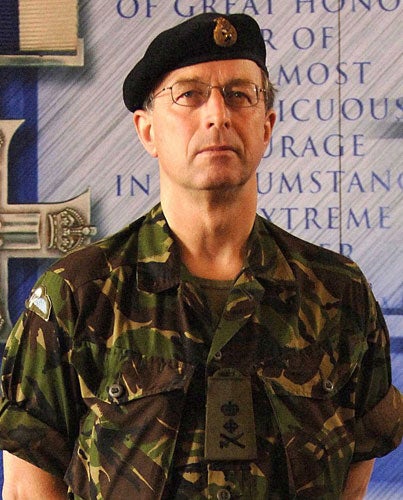'We need 30,000 more soldiers to beat Taliban,' says general
<b>Exclusive:</b> General Sir David Richards, who will today be named as the British Army's new head, appeals for a dramatic 'surge' in Afghanistan

Your support helps us to tell the story
From reproductive rights to climate change to Big Tech, The Independent is on the ground when the story is developing. Whether it's investigating the financials of Elon Musk's pro-Trump PAC or producing our latest documentary, 'The A Word', which shines a light on the American women fighting for reproductive rights, we know how important it is to parse out the facts from the messaging.
At such a critical moment in US history, we need reporters on the ground. Your donation allows us to keep sending journalists to speak to both sides of the story.
The Independent is trusted by Americans across the entire political spectrum. And unlike many other quality news outlets, we choose not to lock Americans out of our reporting and analysis with paywalls. We believe quality journalism should be available to everyone, paid for by those who can afford it.
Your support makes all the difference.A general who believes a "surge" of 30,000 more troops is needed in Afghanistan to fight the Taliban will be appointed as the new head of the British Army today, The Independent has learnt.
General Sir David Richards, who will take over from General Sir Richard Dannatt, is believed to favour sending up to 5,000 more British troops to Afghanistan on top of the 8,000 already in the country. The other 25,000 troops would be made up of US reinforcements and newly trained Afghan soldiers. General Richards also believes that a negotiated settlement may be necessary to end the conflict, but that any talks must take place with the Afghan government and Nato in a position of strength.
Ministers have publicly insisted that despite the impending withdrawal of British forces from Iraq, no further troops will be available for the Afghan mission. However, senior military sources have told The Independent that talks have already been held in Whitehall about possible further deployment next year following a request from General David McKiernan, the head of Nato forces in Afghanistan. The request is understood to be supported by General Richards.
The reshuffle at the top of the Armed Forces means that three commanders with extensive experience in Afghanistan and Iraq will now have key leadership roles in the military. General Richards himself, in his recent post as the head of Nato's International Security Assistance Force (Isaf) in Afghanistan, was the first non-American to command US forces since the Second World War.
He will be replaced in his current job as the Commander-in-Chief of British land forces by Lieutenant General Peter Wall, who has served in Iraq and Afghanistan. Lieutenant General Sir Nick Houghton, who has served in Iraq, has already been selected as Vice Chief of Defence Staff.
The appointments will be a blow to General Dannatt, who had hoped to be promoted to Chief of Defence Staff, the overall head of the military. It is widely believed he missed out on the job because of the Government's annoyance at his public comments over soldiers' welfare and policy in the Iraq war.
General Dannatt appeared to be increasingly engaged in a confrontation with ministers which, many commanders began to feel, led to the Army losing out to the other two services in the scramble for resources.
General Richards will be working closely with the American commander, General David Petraeus, who is taking over as head of US Central Command. General Petraeus, who has been credited with reducing violence in Iraq through the troop "surge", will now be in overall charge of US military policy in Afghanistan and Iraq.
After finishing his stint as head of the Army in the post of Chief of General Staff, General Richards, described as one of the most impressive British commanders in recent times, is expected to eventually move on to the job which had eluded General Dannatt, and become the head of the Armed Forces. The Ministry of Defence has announced that the current Chief of Defence Staff, Air Chief Marshal Sir Jock Stirrup, will stay at his post for an extra two years. This ended the prospects of Admiral Sir Jonathan Band, the head of the Royal Navy, and the RAF's Air Chief Marshal, Sir Glenn Torpy, from succeeding him, as they are due to retire next year.
General Richards has been most recently in the public eye when he gave evidence at the Old Bailey trial of his translator in Afghanistan, Cpl Daniel James, who has been charged with spying for the Iranians.
Senior officers point out that the Government is mistaken if it thinks it now has a malleable man in place. General Richards has ruffled ministerial feathers by speaking his mind while leading operations in Afghanistan, Sierra Leone and East Timor.
Join our commenting forum
Join thought-provoking conversations, follow other Independent readers and see their replies
Comments